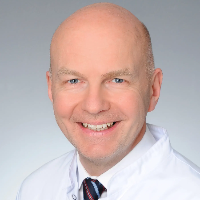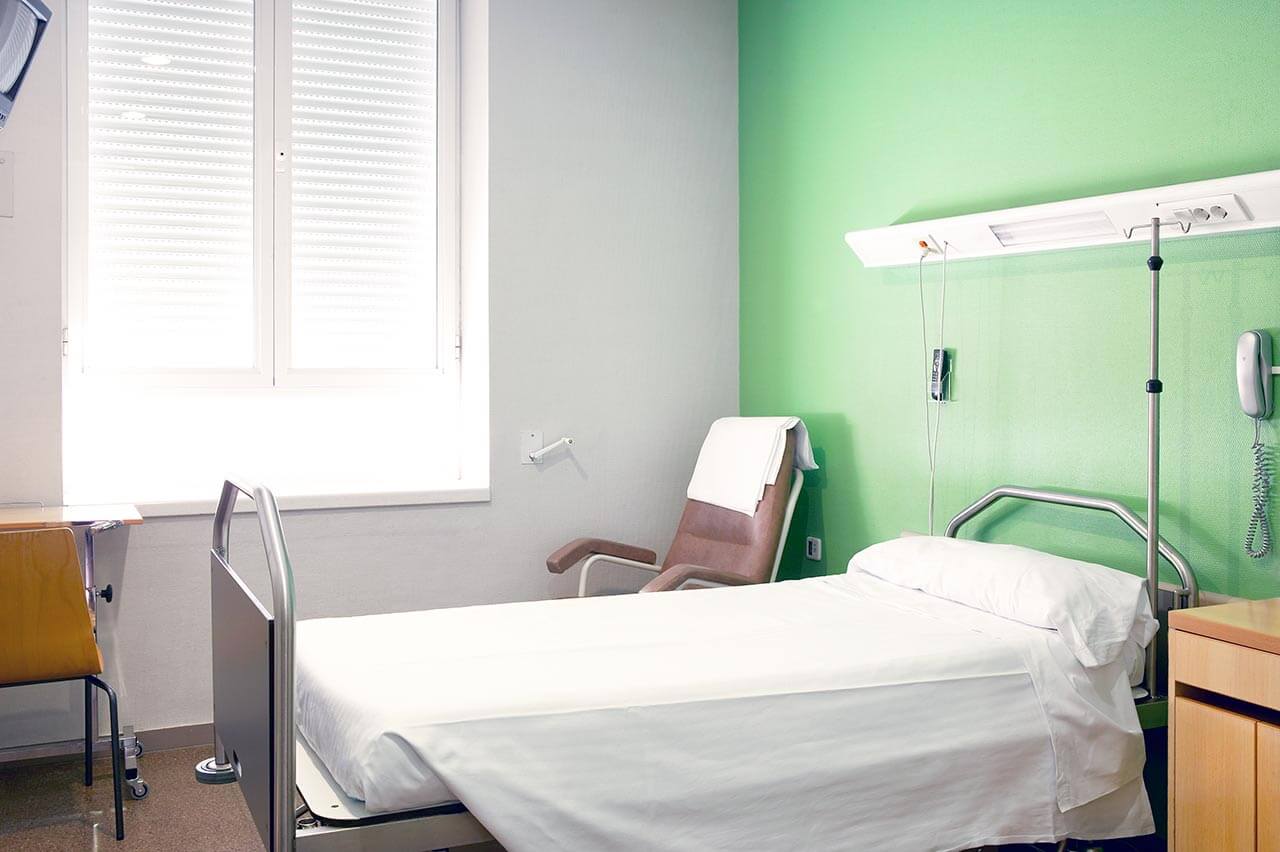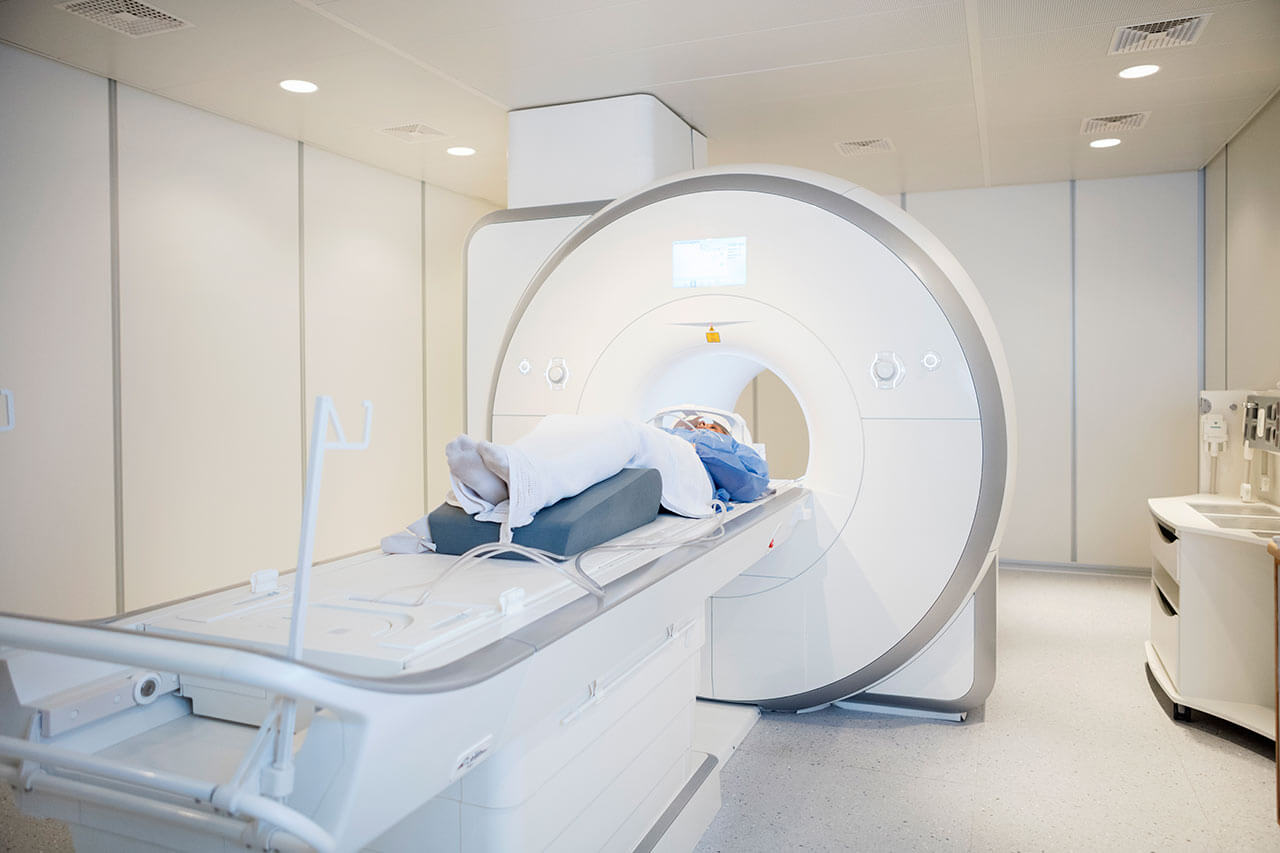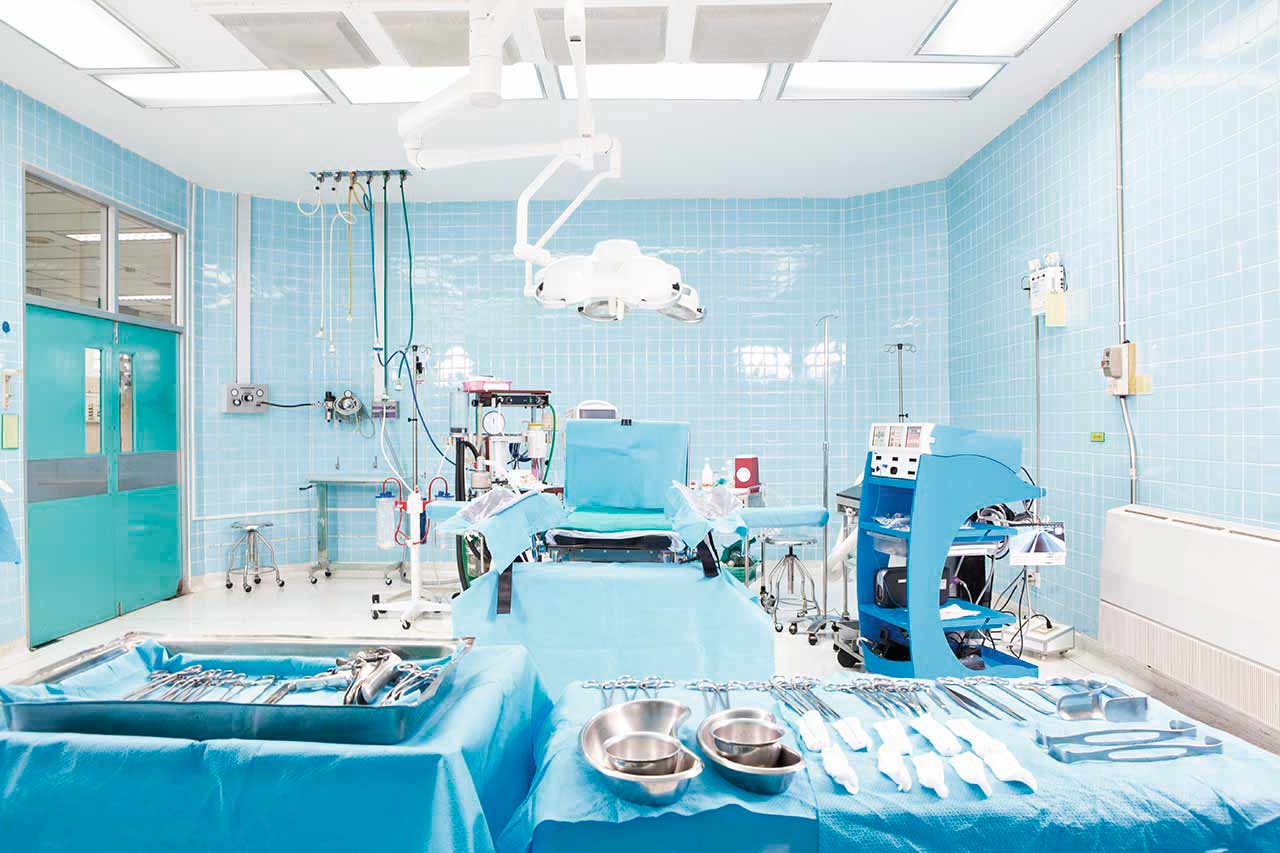
The program includes:
- Initial presentation in the clinic
- clinical history taking
- physical examination
- review of medical records
- laboratory tests:
- complete blood count
- general urine analysis
- differential blood analysis
- biochemical analysis of blood
- TSH-basal, fT3, fT4
- tumor markers
- indicators of inflammation
- indicators of blood coagulation
- chest X-ray
- abdominal ultrasound scan
- CT of the neck, chest and abdomen
- bone marrow biopsy with histological analysis
- 1 course of chemotherapy
- symptomatic treatment
- control examinations
- cost of essential medicines and materials
- nursing services
- full hospital accommodation
- explanation of future recommendations
How program is carried out
During the first visit, the doctor will conduct a clinical examination and go through the results of previous laboratory tests and instrumental examinations. After that, you will undergo an additional examination, including laboratory assessment of liver and kidney function, ultrasound scan. Based on the received results, the doctor will elaborate the chemotherapy regimen. If necessary, related medical specialists will be involved in the elaboration of a treatment regimen (tumor board).
Chemotherapy is carried out as the inpatient procedure, with mandatory admission to the hospital. After the placement of a venous catheter, you will stay in a comfortable ward. An infusion system will be connected to the catheter, through which the required drug or a drug combination will be administered. All drugs are administered by intravenous drip, slowly, so the total duration of the infusion can be up to several hours. All this time, doctors and nurses will monitor your health condition closely.
After the course of chemotherapy, you will stay under medical supervision in the ward for a few more hours. After the completion of the chemotherapy course and control examinations you will receive the medical report with detailed recommendations regarding further treatment. In the future, you will be able to have a distant consultation with your attending physician and schedule the next course of chemotherapy, if necessary.
Required documents
- Medical records
- MRI/CT scan (not older than 3 months)
- Biopsy results (if available)
Service
You may also book:
 BookingHealth Price from:
BookingHealth Price from:
About the department
175 Booking Health patients have already received treatment in the Department of Oncology and Hematology at the University Hospital of Ludwig Maximilian University of Munich.
99% of patients recommend this hospital and department.
You can read reviews about the quality of the Booking Health service here.
The Department of Oncology, Hematology and Bone Marrow Transplantation at the University Hospital of Ludwig Maximilian University of Munich provides the full range of diagnostic and therapeutic services to patients with malignant solid tumors, and benign and malignant blood pathologies. Of particular interest is the treatment of patients with acute leukemia, lymphomas, multiple myeloma, sarcomas, gastrointestinal cancer, lung cancer, breast cancer, and rare malignant tumors. The department is part of the Comprehensive Cancer Center Munich, thanks to which doctors from related specialties are involved in the therapeutic process. All modern diagnostic methods and therapeutic procedures are available here, including bone marrow transplantation, which is often the most effective treatment method for blood cancer. The health of patients is in the safe hands of a highly qualified medical team, consisting of 65 doctors and 130 nurses. The department treats about 2,800 inpatients and more than 10,000 outpatients every year. The department's specialists pay due attention to the psychological state of their patients diagnosed with cancer, so a program of psycho-oncological care is being successfully implemented here. The Head Physician of the department is Prof. Dr. Dr. Michael von Bergwelt.
Healthcare professionals in the field of oncology admit patients with various types of cancer. The department's team of doctors pays special attention to treating colon, stomach, esophageal, pancreatic, liver, bile duct, lung, and breast cancers, as well as bone and soft tissue sarcomas. Doctors are particularly skilled at treating rare malignant solid tumors, such as neuroendocrine tumors and cancers of unknown primary. Upon admission to the department, a patient undergoes diagnostic tests, based on the results of which oncologists, together with surgeons, radiation therapists, radiologists, and other specialists, develop the most effective treatment regimen. As a rule, it is practically impossible to do without surgery. Depending on the particular clinical case, a treatment regimen may also include chemotherapy, radiation therapy, antibody therapy, targeted therapy, hormonal therapy, or immunotherapy. The department's oncologists successfully use hyperthermia combined with chemotherapy to treat bone and soft tissue sarcomas. Hyperthermia improves the effectiveness of chemotherapy by increasing blood flow to the tumor, allowing chemotherapy agents to penetrate deeper into the neoplasm tissues. Psychological care is also an integral part of the therapeutic process, since it is very important to maintain a patient's positive attitude towards a successful treatment outcome in the fight against cancer.
The key focus of the hematology team is the treatment of patients with leukemias, lymphomas, and multiple myeloma. The specialists also treat benign blood diseases, such as anemia and hemoglobinuria. Chemotherapy is an indispensable method in the fight against blood cancer. The department's therapeutic options are, however, not limited to this type of treatment. The department is one of the few in Europe that offers an innovative form of immunotherapy called CAR T-cell therapy. The essence of the method is to harvest the patient's leukocytes and genetically program them to destroy cancer cells. Leukocytes are harvested with the use of special high-tech equipment, after which the resulting biological material is genetically modified. As a result of genetic manipulations, chimeric antigen receptors (CARs) appear on the surface of leukocytes. After the processing and multiplication of cells in the laboratory, they are administered into the patient's body by infusion. CAR T-cell therapy is highly effective and can cure even the most complex cases of blood cancer.
The department's spectrum of therapeutic services is complemented by a bone marrow transplant, which is often indicated for patients with advanced leukemias, lymphomas, and multiple myeloma. The department's specialists have been performing bone marrow transplantation procedures since 1979. The Section for Bone Marrow Transplantation has 24 beds, and thus this is the largest medical facility of this kind in Germany. Every year, more than 100 allogeneic bone marrow transplant procedures (transplantation of donor stem cells) are performed here. The department's transplantation success rate is one of the highest in Europe. This is not surprising, as the department employs professional doctors and has advanced technical resources.
The department specializes in the diagnostics and treatment of the following diseases:
Hematology |
|
| Oncology |
|
Other diseases |
The department's therapeutic options include:
- Chemotherapy
- Radiation therapy
- Antibody therapy
- Targeted therapy
- Hormone therapy
- Immunotherapy
- Hyperthermia combined with chemotherapy
- CAR-T cell therapy
- Bone marrow transplantation
- Other treatment methods
Curriculum vitae
Higher Education and Professional Career
- 1988 - 1996 Medical studies at the Universities of Freiburg, Muenster and Paris (University of Paris-South XI).
- 1996 Admission to medical practice.
- 1994 - 1996 Human Biology studies at the University of Paris-South XI.
- 1996 Master in Biological and Medical Sciences (MSBM, Maitrise de Sciences Biologiques et Medicales).
- 1996 Examination for the US medical license (USMLE), I and II Parts.
- 1997 Thesis, University of Freiburg. Subject: "Phenotypic and functional characteristics of lymphocyte infiltrating tumor in patients with colorectal carcinoma stimulated by interleukin-2 and interleukin-4 in vitro".
- 1997 - 1999 Internship, Department of Internal Medicine I.
- 1999 Board certification in Emergency Medicine, Lower Saxony.
- 1999 - 2002 Postdoctoral Fellow, Dana-Farber Cancer Institute, Harvard Medical School, Boston.
- 2002 Thesis for Dr. rer. nat., with honors, University of Oldenburg. Subject: "Biological and biotechnological analysis of antigen-presenting B cells activated by CD40".
- 2002 - 2007 Internship and Scholarship, Department of Internal Medicine I, University Hospital Cologne.
- 2003 - 2009 Head, Max Eder Junior Research Group, German Cancer Society.
- 2006 Board certification in Internal Medicine, Hematology and Oncology.
- 2007 Venia Legendi in Internal Medicine. Subject: "Analysis of the use of the antigen-presenting function of B cells for tumor immunotherapy".
- 2008 Board certification in Intensive Care.
- 2008 Director of the Cologne Interventional Immunology Project and Scientific Director of the Stem Cell Transplant Program.
- 2009 Board certification in Infectiology.
- 2011 Managing Senior Physician.
- 2012 Adjunct Professor in Internal Medicine, University of Cologne.
- 2012 Adjunct Professor and Head of Hematology Сourse, Ronald Finn Department of Experimental Medicine, University of Liverpool (rejection).
- 2015 CARTime Research Consortium (CAR T Cell Clinical Study in Melanoma), Research Coordinator from the German Federal Ministry of Education and Research (BMBF).
- 2016 Research Consortium of the German Cancer Society (DKH) "Inhibition of control points of the immune response in Hodgkin's lymphoma", Head of the Section of Tumor Immunology.
- Since 2017 Head of the Department of Oncology, Hematology and Bone Marrow Transplantation, University Hospital of Ludwig Maximilian University of Munich.
Prizes, Awards, Honors and Memberships
- 2015 Best Abstract Award from the German Society of Hematology and Oncology, DGHO (Co-Author).
- 2010 Travel Award from the American Society for Bone Marrow Transplantation.
- 2010 Basic Science Award (O84 Abstracts, Co-Author) from the European Society for Blood and Marrow Transplantation.
- 2002 Member of the Josep Carreras Leukaemia Foundation, Germany.
- 2001 Member of the American Lymphoma Research Foundation.
- 1999 Travel Award from the American Society of Hematology.
- 1999 EMSA Science Award, University of Prague.
- 1997 Mildred Scheel Foundation Fellow, German Cancer Society, University of Prague.
Photo of the doctor: (c) LMU Klinikum
About hospital
According to the Focus magazine, the University Hospital of Ludwig Maximilian University of Munich is regularly ranked among the best medical institutions in Germany!
The hospital is the largest multidisciplinary medical facility, as well as a leading research and training center in Germany and Europe. The hospital is proud of its bicentenary history and tirelessly confirms its primacy at the national and international levels. The outstanding quality of medical care is complemented by highly productive research activities, thanks to which many effective diagnostic and therapeutic methods, saving people’s lives, have been presented in medical practice.
The medical facility includes two main buildings, Grosshadern and Innenstadt. The hospital has 29 specialized departments, 53 interdisciplinary centers, 11 institutes, and many sections. More than 500,000 patients are treated here every year, which indicates the hospital's excellent reputation. A large and highly professional medical team, consisting of 1,800 doctors and 3,300 nursing staff, works for the benefit of patients. The hospital has 2,000 beds to accommodate patients.
The hospital's infrastructure deserves special attention: advanced diagnostic equipment that allows doctors to detect the slightest pathological changes in the human body, the latest operating rooms with highly efficient monitoring systems, robot-assisted surgical systems that facilitate sparing operations, and proper postoperative care.
Excellent technical resources and highly professional medical staff are undoubtedly the hospital's pride, but the medical facility also pays attention to the patient's comfort and to a humane attitude toward their life situation. When providing the necessary medical care, doctors and nursing staff always show a friendly attitude, inform patients in detail about the upcoming diagnostic and therapeutic procedures, gladly answer all questions of interest to patients, and provide moral support during the therapeutic process.
The hospital has many prestigious quality certificates, including a DIN EN ISO 9001 certificate, an IQM certificate, an endoCert certificate, certificates from the German Cancer Society (DKG) for treating various types of cancer, the German Cardiac Society (DGK), the German Society for Orthopedics and Trauma Surgery (DGOU), etc. Thus, patients can count on the best possible treatment outcome due to the use of the most effective and, at the same time, sparing therapeutic techniques.
Photo: (с) depositphotos
Accommodation in hospital
Patients rooms
The patients of the University Hospital of Ludwig Maximilian University of Munich live in comfortable, spacious, single and double patient rooms with a modern design. Each room is equipped with an ensuite bathroom with a shower and toilet. The furnishing of a standard patient room includes a comfortable bed, the position of which can be adjusted using the remote control, a locker for storing personal belongings, a TV, and a telephone. Also, if desired, you can connect to the Internet. In addition, patients can opt for enhanced-comfort rooms, with a safe, a fridge, and upholstered furniture.
The hospital has an excellent infrastructure. The medical facility’s area houses a bank, ATMs, a hairdresser, shops with a wide range of food, drinks, newspapers, magazines, and personal hygiene items, play areas for children, and a beautiful garden for walking, etc.
Meals and Menus
The patient and his accompanying person are offered a daily choice of three menus, including a vegetarian one. If you are on a specific diet for any reason, you will be offered an individual menu. Please inform the medical staff about your dietary preferences prior to the treatment.
Further details
Standard rooms include:
Religion
Religious services are available upon request.
Accompanying person
Your accompanying person may stay with you in your room or at a hotel of your choice during the fixed program.
Hotel
You may stay at a hotel of your choice during an outpatient program. Our managers will help you to choose the best option.
The hospital offers a full range of laboratory tests (general, hormonal, tests for infections, antibodies, tumor markers, etc.), genetic tests, various modifications of ultrasound scans, CT scans, MRI and PET/CT, angiography, myelography, biopsies, and other examinations. Treatment with medications, endoscopic and robotic operations, and stereotaxic interventions are carried out here, modern types of radiation therapy are also used. The hospital offers patients all the necessary therapeutic techniques.
- Allogeneic bone marrow transplantation
- Microsurgical transplantation of head and neck tissues
- Microsurgical resection of brain tumors with intraoperative fluorescence
- Minimally invasive treatment of spine pathologies
- Joint replacement with postoperative rehabilitation (fast track program)
Patients with benign and malignant neoplasms of various localizations, pathologies of arteries and veins, herniated discs, osteoporosis, congenital and acquired pathologies of the musculoskeletal system, benign and malignant pathologies of the mammary gland, and other pathologies.
Which specialties of the University Hospital of Ludwig Maximilian University of Munich are the best?
- Interventional and diagnostic neuroradiology
- Vascular surgery
- Cardiac surgery
- Mammalogy
- Gastroenterology and hepatology
Over 1,700 highly qualified doctors work at the hospital.





